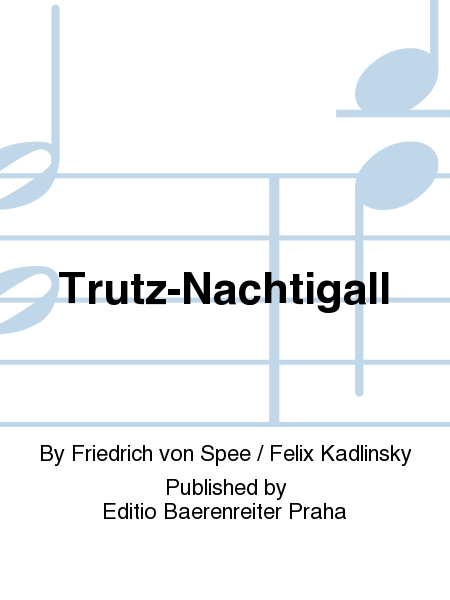Trutz-Nachtigall
26 Melodien mit Generalbass-Begleitung
-
Ships in 24 hours
Details
Description
SKU: PA.H07930
26 Melodien mit Generalbass-Begleitung. Composed by Felix Kadlinský and Friedrich von Spee. Czech title: Trutznachtigall - Zdoroslavicek. Classical. Singing Score, Performance score. With Publication language: Czech/German. Editio Baerenreiter Praha #H07930. Published by Editio Baerenreiter Praha (PA.H07930).ISBN 9790260103108. 28.5 x 19.5 cm inches.
The celebrated collection of sacred songs with the poetic title"Trutznachtigall oder Geistlich-Poetisch Lust Waldleins"was published for the first time in 1634, without melodies, then after the author's death the work was published in Cologne in 1649 with the melodies and figured bass.
The poet behind these gems of German Catholic lyricism was Friedrich Spee von Langenfeld. The entire collection was translated into Czech verse by his fellow brother, the Jesuit Felix Kadlinsky who gave it the delightful title"Zdoroslavicek v kratochvilnem hajicku postaveny, do kterehozto hajicku pobozna duse"casto choditi a hlasu toho libezneho slavicka poslechnouti a z neho poteseni duchovniho nabyti moci bude. [The Rival Nightingale alighted here in this restful little grove, in this grove the pious soul often will walk and listen to the voice of the pleasing nightingale, and in doing so he will be filled with spiritual comfort.]
Zdoroslavicek is a leading work of Czech Baroque poetry. As a poet, Kadlinsky is today ranked among the likes of Michna, Bridel and Comenius. PhDr. Jan Trojan, a professor of Masaryk University in Brno and an authority on early music and the folk song, arranged the original two-part melody with bass for four voices in the manner of figured bass, such that this edition respects Kadlinsky's notation, including his deviations from the German original. These passages are described in the Critical Commentary. The melodies are accompanied by both the original German text, and Kadlinsky's period poetic translation into Czech.

 Share
Share